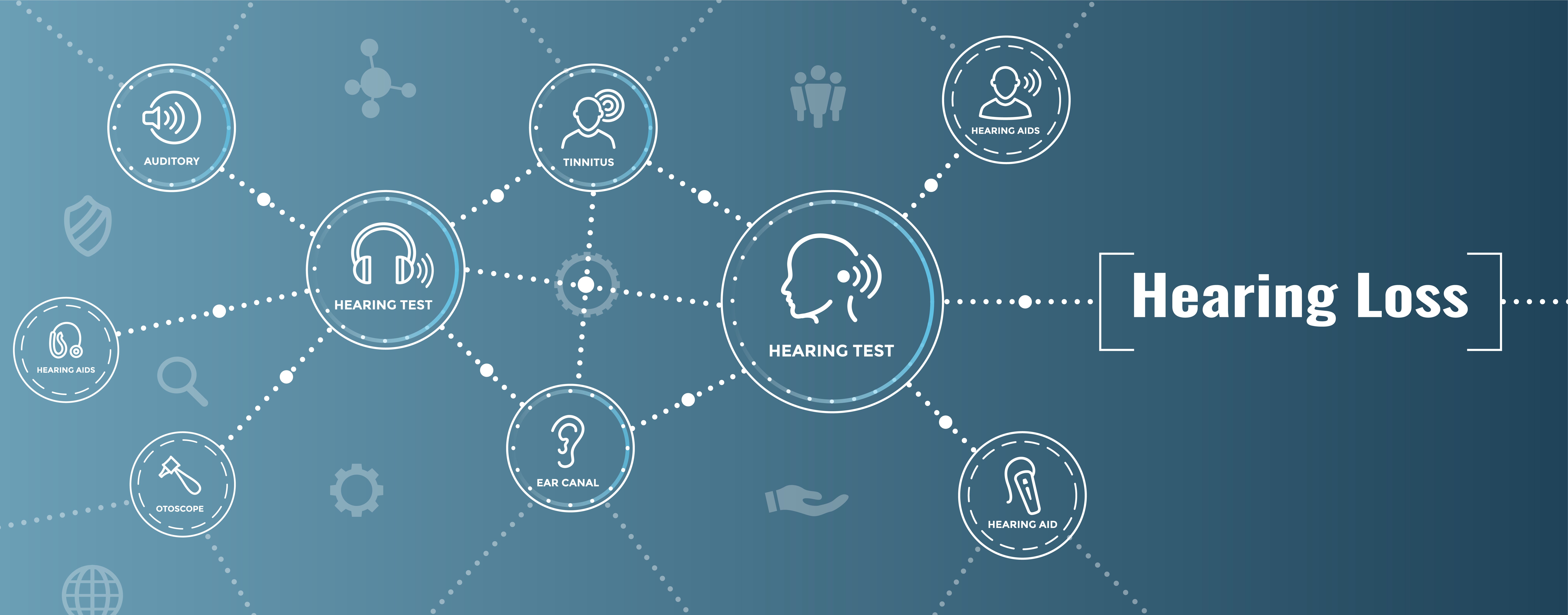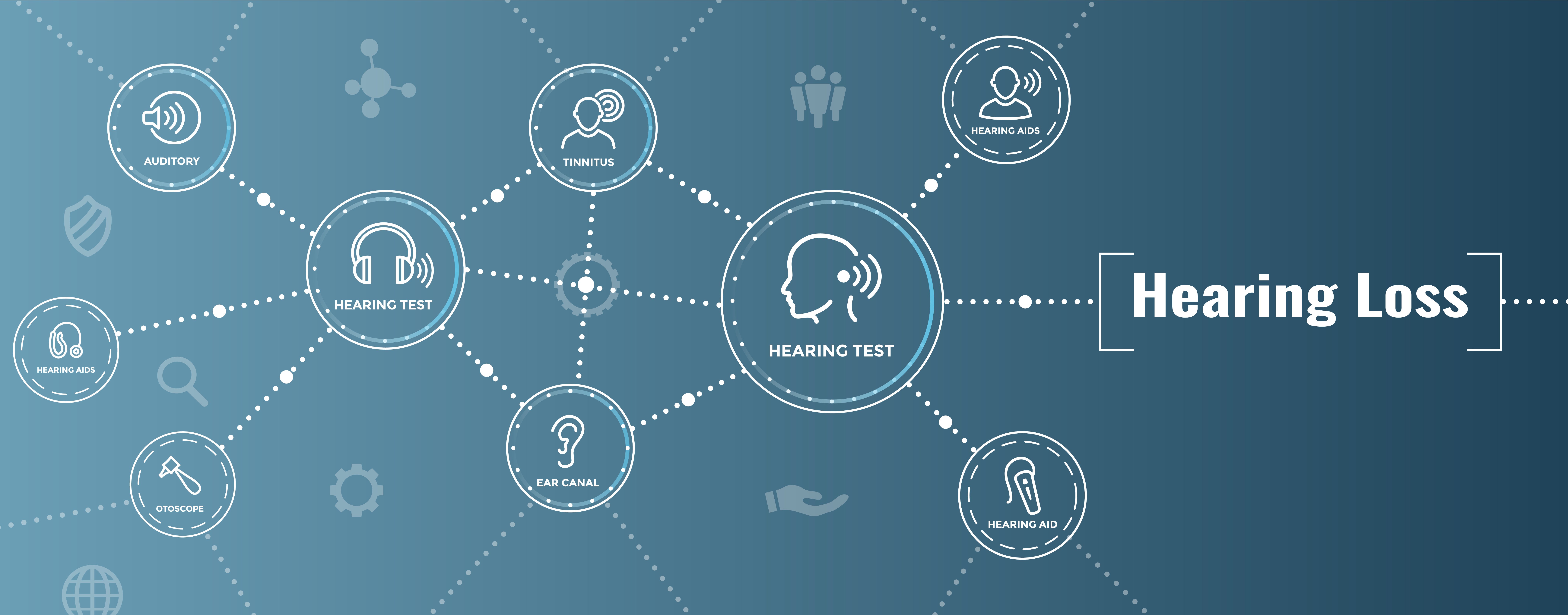The Consequences of Untreated Hearing Loss
August 18th, 2023 | 7 min. read


Hearing is one of the five senses connecting us to the world. Yet, when it diminishes, its repercussions go far beyond the inability to hear sounds. Today, we will delve deeper into 12 significant consequences of untreated hearing loss, shedding light on why it's so much more than just a decrease in auditory perception. We will start with points 1 to 3...
1. Social Isolation
The joys of social interactions - from lighthearted banter with friends to heartfelt conversations with loved ones - can gradually become challenges for those with hearing loss. Imagine being at a bustling family gathering or a café with friends and struggling to discern individual voices against the background noise. Over time, this struggle can make social settings more daunting than delightful.
This challenge often leads many to consciously or subconsciously withdraw from social scenarios to avoid the embarrassment of asking someone to repeat themselves or misinterpreting what was said. This gradual retreat makes it harder for loved ones to notice until the person with hearing loss has almost entirely isolated themselves. Over time, this isolation can foster feelings of loneliness, potentially leading to more severe emotional and mental health issues.
Read more about hearing loss and social isolation by clicking here.
2. Mental Health Implications
The emotional toll of untreated hearing loss is vast and often underestimated. As social creatures, human beings thrive on connections. Frustration, embarrassment, and inadequacy can seep in when hearing loss is a barrier to these connections.
There's also a direct impact on one's mental well-being. Multiple studies have linked untreated hearing loss with depression and anxiety. The stress of constantly trying to keep up with conversations and the inherent isolation creates a fertile ground for these conditions. The silence isn't just external; it's an internal feeling of being cut off, leading to a profound sense of solitude even in the most crowded places.
3. Cognitive Decline
While it might seem like a stretch to link hearing loss with cognitive decline, emerging research has begun to establish a concerning connection. Untreated hearing loss can lead to reduced auditory stimulation, which means the brain gets less exercise in processing sounds and speech. Like any muscle, it can atrophy if the brain isn’t exercised.
Furthermore, the brain spends extra energy deciphering incomplete sound information, leaving less cognitive bandwidth for tasks like memory and thinking. Over time, this strain can accelerate cognitive decline and potentially increase the risk of conditions like dementia. Social isolation, a byproduct of hearing loss, further contributes to this decline as social interactions play a critical role in keeping our brains sharp and engaged.
Get Your Hearing Loss Evaluated and Treated at any of our 9 locations in Houston
Please schedule an appointment for your hearing loss consultation at any of our nine convenient locations in Houston, TX, today.
Untangling the Deeper Effects of Hearing Loss: Balance, Relationships, and Life’s Quality
Hearing loss, often associated solely with auditory complications, has far-reaching consequences that touch daily life. As we focus on points 4 to 6 from our comprehensive list, we delve deeper into how untreated hearing loss can influence our physical safety, personal relationships, and the overall quality of our lives.
4. Balance and Safety
Our sense of hearing is intricately linked to our spatial awareness. Through auditory cues, our brains determine the direction of incoming sounds, like the car honk or a friend's call. This provides a more prosperous, 360-degree perception of our surroundings and aids our sense of balance.
But what happens when this auditory input is compromised? For starters, locating the origin of sounds becomes more challenging, skewing our perception of where potential dangers might arise. A bicycle bell from behind might go unnoticed, or the approaching footsteps of a running child might be missed, both of which can lead to potential accidents.
Furthermore, the inner ear, which plays a pivotal role in hearing, is also a key component of our vestibular system, directly influencing balance. Those with untreated hearing loss might find their physical coordination and balance impacted, leading to an increased risk of falls. For the elderly, such falls can have severe ramifications, including fractures or prolonged hospital stays.
Learn more about hearing loss and balance, falls, and safety here.
5. Strained Relationships
Communication forms the foundation of our relationships, be it the whispered secrets between best friends, the playful banter between couples, or the heartfelt discussions between family members. With untreated hearing loss, these interactions become riddled with challenges.
It starts small: the frequent requests to repeat a sentence, the misunderstood words that lead to mild confusion, or the sense of detachment when one misses out on shared laughter. Over time, these minor hiccups can compound. Loved ones might feel that the person with hearing loss is not listening or is disinterested. On the other hand, the individual might feel isolated, even in the company of close ones, leading to feelings of exclusion and emotional distress. As these miscommunications mount, they can drive a silent wedge between individuals, causing strain, frustration, and even resentment.
Learn more about hearing loss and strained relationships here.
6. Diminished Quality of Life
Life is a mosaic of experiences, many of which we savor through our sense of hearing. The melodies of a favorite song, the rustling of leaves on a windy day, and the infectious giggles of a child are the soundtracks to our existence.
When untreated hearing loss filters our auditory experience, it mutes these vibrant moments. Every day joys become hurdles. For instance, a simple phone call might become a laborious task, watching a movie could require strained focus to catch dialogues, or attending social gatherings might seem more exhausting than exhilarating.
These challenges chip away at one's confidence and zest for life. Activities once pursued with enthusiasm might be avoided, and the vibrancy of life might seem dim, leading to a diminished sense of well-being and satisfaction.
Navigating the Subtler Effects of Hearing Loss: Professional Stumbles, Silent Dangers, and Exhaustion
The complexities of untreated hearing loss go beyond the immediate challenge of deciphering sounds. As we move further down the list, it becomes evident that the absence of clear auditory input affects not only personal spheres but also professional environments, safety aspects, and even our mental energy reservoirs. To unravel these intricate repercussions, let’s delve deeper into points 7 through 9.
7. Career Impediments
The modern workplace thrives on effective communication, collaboration, and clarity. In this arena, untreated hearing loss can be an unforeseen stumbling block. Think about the intricate dynamics of a team meeting: Multiple voices, varying pitches, overlapping ideas—all of which demand astute attention.
For someone grappling with untreated hearing loss, these meetings can become mazes of missed points or needed directions. It's not just about struggling to hear; it's about the subsequent effects: the hesitation in contributing to a discussion for fear of redundancy, the potential misinterpretations leading to task errors, or the reluctance to lead projects or presentations.
Such challenges can subtly influence perceptions among peers and superiors. They might misconstrue the individual's hesitations as a lack of initiative or their need for repeated clarifications as inattentiveness. Over time, these misinterpretations can hinder professional growth, stifle promotion opportunities, and sometimes even jeopardize job security.
8. Missed Alerts
Our world is filled with auditory cues designed for our safety. The beep of a reversing vehicle, the distant wail of an ambulance siren, the chirping of a smoke detector—each sound acts as an alert, signaling us to work or be aware.
For those with untreated hearing loss, these signals might get lost in the ambient noise. Such missed cues carry tangible risks. Imagine not hearing the warning shout of a co-worker or failing to detect a leaking gas hiss in the kitchen; the implications could range from minor accidents to life-threatening situations.
Moreover, with a compromised sense of hearing, familiar environments like one's home or neighborhood can become arenas of potential hazards, imbuing daily life with an underlying unease and vulnerability.
9. Fatigue
On the surface, hearing might seem like a passive activity. Yet, for those with hearing difficulties, it's anything but effortless. The brain works in overdrive, constantly trying to piece together fragments of conversations, filter out background noises, and fill in the gaps of missed auditory inputs.
This constant mental juggling act is exhausting. It's akin to solving a puzzle without all the pieces every time one communicates. The resultant fatigue isn’t just physical; it's cognitive. By the end of a day filled with strained listening, individuals often find themselves drained, craving solitude and silence—not necessarily because they seek isolation, but because they need respite from the relentless effort of deciphering sounds.
This chronic fatigue can seep into other aspects of life, dimming enthusiasm for hobbies, curtailing social engagements, and even influencing mood and overall well-being.
The Latter Repercussions of Hearing Loss: Speech, Tinnitus, and Economic Implications
While the more immediate effects of untreated hearing loss often capture our attention, individuals face more profound, subtler challenges as the condition progresses. Expanding our focus on points 10 through 12, we highlight the intricacies of speech recognition, the pervasive nature of tinnitus, and the economic ramifications that often go unnoticed.
10. Speech Recognition
Hearing loss doesn’t merely manifest as a drop in volume; it's more nuanced. Frequencies, pitches, and subtle tones that enrich the language can become elusive. Words and syllables often blend, turning familiar phrases into cryptic sound bites.
Understanding speech becomes a herculean task, especially in environments with background noises like cafes, public transport, or crowded events. The consonants, which lend clarity to words, are typically softer and can get drowned out, making "cat" sound like "bat" or "shoe" sound like "blue." These frequent misinterpretations can lead to confusion, making everyday interactions tedious and, at times, embarrassing.
Over prolonged periods, this continuous struggle can cause individuals to shy away from engaging in conversations, potentially leading to feelings of isolation and a diminished sense of self-assuredness.
11. Tinnitus
Tinnitus, often described as a constant ringing, buzzing, or humming in the ears, is a frequent companion to hearing loss patients. While it might seem minor to some, it's an unrelenting disturbance for many.
This continuous background noise can create layers of challenges. The persistent sound often exacerbates the difficulty in understanding speech. Moreover, its omnipresence can disrupt focus, hinder relaxation, and even interfere with sleep. Over time, the mental toll of this unasked-for soundtrack can be significant, leading to heightened stress levels, anxiety, and in some cases, even depressive symptoms.
12. Economic Implications
The costs of untreated hearing loss are not solely measured in missed conversations or emotional strains; they have tangible economic repercussions. On a personal level, the challenges faced in professional settings, as mentioned earlier, can lead to reduced job opportunities or even premature retirement. This has direct implications on earning potential and financial stability.
On a broader scale, untreated hearing loss results in higher healthcare costs. As individuals grapple with associated mental health challenges or accidents resulting from missed auditory cues, they may require more frequent medical consultations, treatments, or hospitalizations. Additionally, the individual bears the cost burden; employers face decreased productivity, and healthcare systems experience increased strain.
In Conclusion
Life is best experienced when all our senses function effectively. Untreated hearing loss impacts more than just our hearing ability, affecting various aspects of our lives. Understanding its broad effects highlights the need for early diagnosis, prompt treatment, and public awareness. Addressing hearing loss is more than just hearing; it's about improving the overall quality of life.
Dr. Alissa Vorous, AuD, is an experienced audiologist at Houston ENT and Allergy, dedicated to helping patients achieve optimal hearing health through comprehensive testing and personalized treatment solutions.
Topics:
